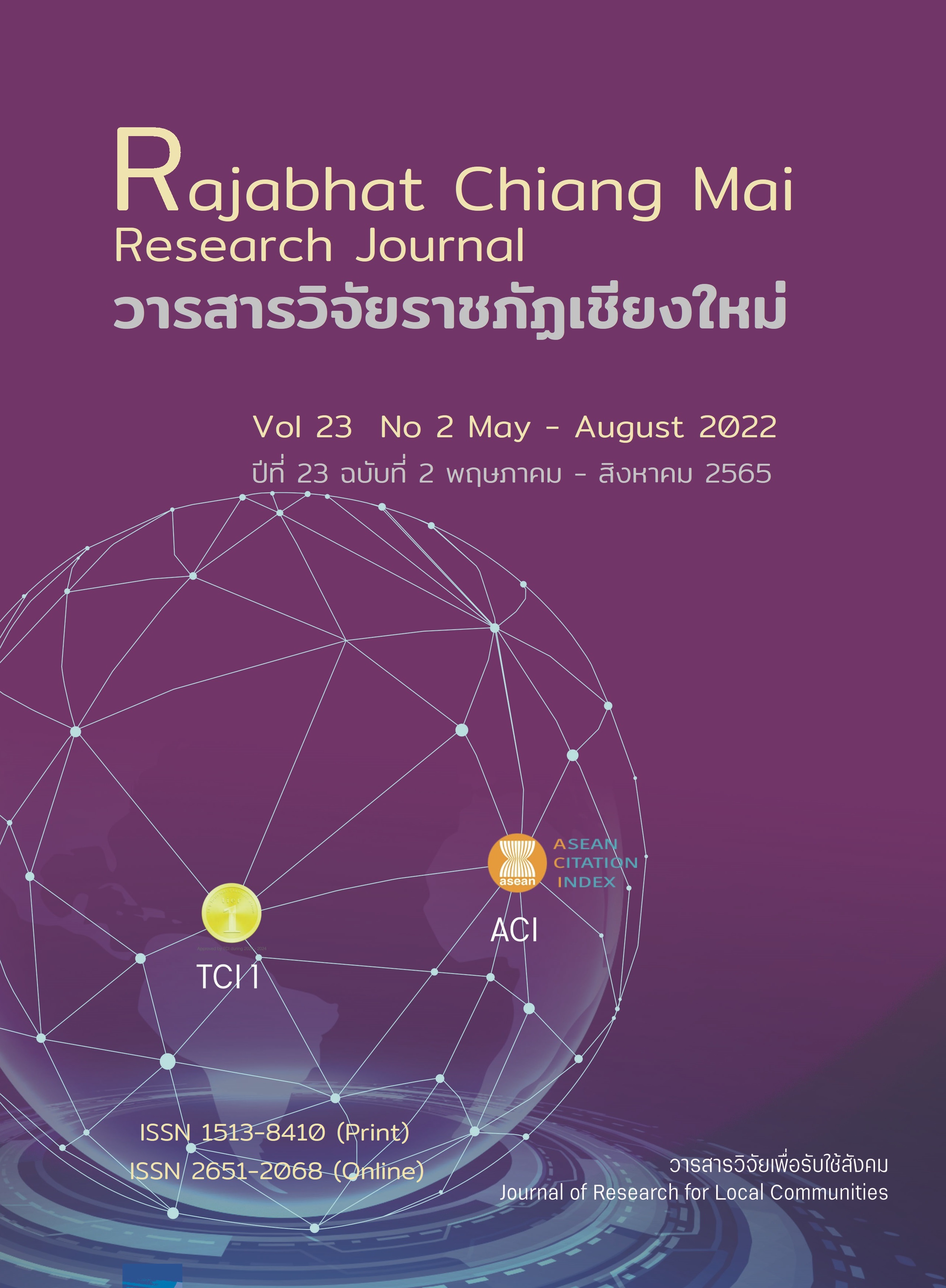ความรู้ ทัศนคติ และปัจจัยที่มีผลต่อการตัดสินใจในการผลิตข้าวอินทรีย์ของชาวนาในจังหวัดพิษณุโลก
DOI:
https://doi.org/10.14456/rcmrj.2022.258928คำสำคัญ:
ข้าวอินทรีย์, ข้าวปลอดภัย, การตัดสินใจ, ความรู้, ทัศนคติ, ความคิดเห็น, ชาวนาบทคัดย่อ
การศึกษานี้เป็นการศึกษาระดับความรู้ ทัศนคติ และปัจจัยที่มีผลต่อการตัดสินใจในการผลิตข้าวอินทรีย์ของชาวนาในจังหวัดพิษณุโลก โดยการสุ่มตัวอย่างเกษตรกรผู้ปลูกข้าวแบบไม่ใช้ความน่าจะเป็นจำนวน 150 คน โดยการสุ่มเลือกแบบบังเอิญ กลุ่มตัวอย่างแบ่งออกเป็น 3 กลุ่ม กลุ่มละ 50 คน ตามรูปแบบการปลูกข้าว คือ กลุ่มเกษตรกรผู้ปลูกข้าวอินทรีย์ กลุ่มเกษตรกรผู้ปลูกข้าวปลอดภัย และกลุ่มเกษตรกรผู้ปลูกข้าวโดยใช้วิธีการปลูกทั่วไป โดยเครื่องมือที่ใช้ในการรวมรวมข้อมูลคือแบบสอบถามที่ผ่านการรับรองจากคณะกรรมการจริยธรรมการวิจัยในมนุษย์ (โครงการวิจัยรหัส PSRU-EC 2021/014) ผลการศึกษา พบว่า เกษตรกรผู้ปลูกข้าวส่วนใหญ่จะมีอายุอยู่ในช่วง 51-60 ปี และจบการศึกษาอยู่ในระดับประถมศึกษา เกษตรกรผู้ปลูกข้าวเคยรับรู้ข้อมูลข่าวสารเกี่ยวกับการปลูกข้าวอินทรีย์ถึงร้อยละ 78.00 โดยแหล่งข้อมูลที่ได้รับมากที่สุด คือ เจ้าหน้าที่ส่งเสริมการเกษตร (ร้อยละ 71.33) รองลงมา ได้แก่ เอกสาร (ร้อยละ 28.00) และผู้นำชุมชน (ร้อยละ 27.33) ตามลำดับ เมื่อวัดระดับความรู้การผลิตข้าวอินทรีย์เห็นได้ว่าเกษตรกรผู้ปลูกข้าวในจังหวัดพิษณุโลกมีความรู้ในอยู่ในระดับปานกลาง-ระดับมาก (ร้อยละ 63.20-80.72) สำหรับภาพรวมทัศนคติของเกษตรกรผู้ปลูกข้าวในการยอมรับการผลิตข้าวอินทรีย์อยู่ในระดับมากที่สุด ( = 4.05±0.37) และปัจจัยที่ส่งผลทำให้เกิดการตัดสินใจในการปลูกข้าวอินทรีย์ คือ ปัจจัยด้านการสนับสนุนปัจจัยการผลิตข้าว (ระดับมากที่สุด : (
= 4.51±0.05) รองลงมา คือ ปัจจัยด้านสังคม (ระดับมาก :
=4.14±0.19) ปัจจัยด้านเศรษฐกิจ (ระดับมาก :
= 4.06±0.35) และปัจจัยด้านนิเวศวิทยา (ระดับปานกลาง:
= 2.63±1.34) ตามลำดับ
Downloads
เอกสารอ้างอิง
Aunsub, P. & Srisuwan, S. (2014). Farmer's Opinion on Good Agricultural Practice System (GAP) of Rice Ban Phraek District, Phra Nakhon Si Ayutthaya Province. Agricultural Science Journal, 45(2), 197-200. http://www.crdc.kmutt.ac.th/Data%202014/ CRDC8/data/197-200.pdf (In Thai)
Kotiram, P., Toomhirun, C. & Khlibtong, J. (2021). Extension of organic rice production of farmers in Kanthararom Sub-district, Krasang District, Buri Ram Province. Paper presented at the 10th STOU National Research Conference, Sukhothai, Thailand. (In Thai)
Lamwanna, S. & Srisuwan, S. (2019). Opinions of farmers on rice production according to organic rice standards Huai Thap Than District, Srisaket Province. King Mongkut's Agricultural Journal, 37(1), 394-404. https://li01.tci-thaijo.org/index.php/agritechjour nal/article/view/198001/137864 (In Thai)
Office of the National Economic and Social Development Council (NESDC). (2020). The Thailand’s top 10 exports of agricultural products. Retrieved from http://dataset. nabc.go.th/group/economy-and-marketing. (In Thai)
Phitsanulok Province Statistical Office. (2015). The analysis on the existing situation of Province's spatial data. Retrieved from http://osthailand.nic.go.th/masterplan_area/ userfiles/file%20Download/Report%20Analysis%20Province. (In Thai)
Phoket, Y., Yooprasert, B. & Tangwiwat, P. (2016). The extension of safety and standardized rice production adhering to good agricultural practice for farmers in Roi Et Province. Khon Kaen Agricultural Journal, 44(1), 624-629. http://ag2.kku.ac.th/kaj/PDF. cfm?filename=P043%20Ext12.pdf&id=2317&keeptrack=0 (In Thai)
Rice Department. (2020). Registration of certified organic rice in the year 2019. Retrieved from http://dric.ricethai land.go.th/index.php/en/2016-04-27-03-32-56. (In Thai)
Ruaykijakarn, N., Suwanmaneepong, S. & Kuhaswonvetch, S. (2018). Knowledge and attitudes towards marketing innovation of organic rice farmers in Sanam Chai Khet organic agriculture group, Chachoengsao province, Thailand. International Journal of Agricultural Technology, 14(7), 1829-1842. https://www.researchgate.net/publication/ 332250411
Sharifzadeh, M.S, & Abdollahzadeh, G.. (2021). The impact of different education strategies on rice farmers’ knowledge, attitude and practice (KAP) about pesticide use. Journal of the Saudi Society of Agricultural Sciences, 20(5), 312-323. https://doi.org/10.1016/j. jssas.2021.03.003
Suckcharuan, W. (2009). Organic rice growing adoption of farmers in Wang Nam Yen Sub-district, Sawaeng Ha District, Ang Thong Province. (Master’s Thesis, Kasetsart University). (In Thai)
The Thailand Research Fund. (2013). Organic rice-growing farming policy : Safety rice and low cost. Retrieved from http://prp.trf.or.th/trf-policy-นโยบายส่งเสริมการผลิตข/. (In Thai)
Tien, D.N., Hoang, H.G, & Sen, L.T.H. (2022). Understanding farmers’ behavior regarding organic rice production in Vietnam. Organic Agriculture, 12, 63–73. https://link. springer.com/article/10.1007/s13165-021-00380-0
Viatiwat, S. (2021). The Comparison of Costs and Returns between Organic Rice Farming and Chemical Rice Farming. (Independent Study, Rajamangala University of Technology Thanyaburi). (In Thai)
Yooprasert, B. & Keowan, B. (2015). Information acknowledgement and agricultural learning exchange of farmers. Journal of Social Sciences, 4(2), 43-54. https://so02.tci-thaijo.org/index.php/JCDLQ/article/download/126647/96282/335170 (In Thai)
ดาวน์โหลด
เผยแพร่แล้ว
รูปแบบการอ้างอิง
ฉบับ
ประเภทบทความ
สัญญาอนุญาต
ลิขสิทธิ์ (c) 2022 วารสารวิจัยราชภัฏเชียงใหม่

อนุญาตภายใต้เงื่อนไข Creative Commons Attribution-NonCommercial-NoDerivatives 4.0 International License.
1. บทความ ข้อมูล เนื้อหา รูปภาพ ฯลฯ ที่ได้รับการตีพิมพ์ใน “Community and Social Development Journal” ถือเป็นลิขสิทธิ์ของ Community and Social Development Journal มหาวิทยาลัยราชภัฏเชียงใหม่ และเพื่อให้เผยแพร่บทความได้อย่างเหมาะสมผ่านสื่อสิ่งพิมพ์และอิเล็กทรอนิกส์ ผู้เขียนยังคงถือครองลิขสิทธิ์บทความที่ตีพิมพ์ภายใต้ใบอนุญาต Creative Commons Attribution (CC BY) ซึ่งอนุญาตให้เผยแพร่บทความซ้ำในแหล่งอื่นได้ โดยอ้างอิงต้องอ้งอิงบทความในวารสาร ผู้เขียนต้องรับผิดชอบในการขออนุญาตผลิตซ้ำเนื้อหาที่มีลิขสิทธิ์จากแหล่งอื่น
2. เนื้อหาบทความที่ปรากฏในวารสารเป็นความรับผิดชอบของผู้เขียนบทความโดยตรง ซึ่งกองบรรณาธิการวารสารไม่จำเป็นต้องเห็นด้วยหรือร่วมรับผิดชอบใดๆ














